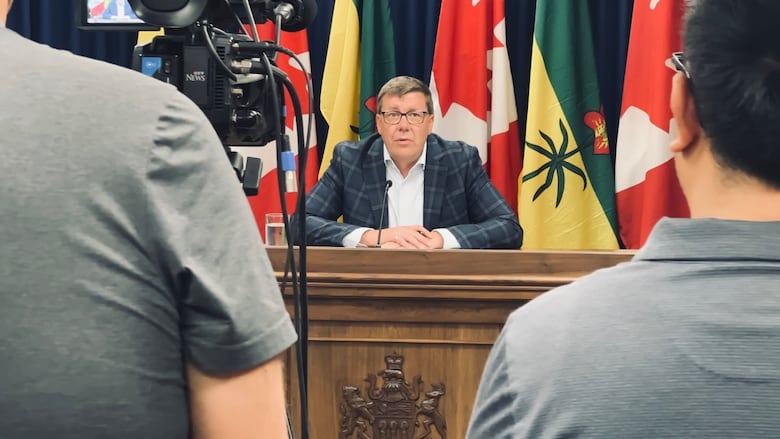Sask. premier calls for Canada to reduce or remove counter-tariffs
Opposition NDP says it’s time for Sask. to 'show a backbone' and leverage potash and uranium holdings

Saskatchewan Premier Scott Moe continued his stance Friday that Canada should not resort to retaliatory measures in its trade war with the U.S.
On Friday, an executive order by U.S. President Donald Trump came into effect that increases tariffs on Canadian goods to 35 per cent, up from 25 per cent.
"I'd say our first step as Canadians is to move towards reducing and even removing some of the counter-tariffs that we have in place," Moe said at a press conference in Saskatoon.
Goods covered by the current Canada-U.S.-Mexico Agreement (CUSMA) are exempt and Moe said that accounts for 95 per cent of Saskatchewan's exports to the U.S.
He credited Dominic LeBlanc, the minister responsible for Canada-U.S. trade, for his work in Washington for helping those exemptions remain in place.
The premier said other global, broad-based sectorial tariffs are improving the environment for goods covered by CUSMA and that Canada should consider the type of trade environment it wants to foster.
"That is a low-tariff or no-tariff trade environment," said Moe.
"Our very argument and what is factually happening today is that President Trump's tariffs are causing harm to American families and causing harm to American businesses," Moe said.
Any counter-tariff Prime Minister Mark Carney or anyone puts on American goods would do similar harm and "would then cost us more and do harm to the competitiveness of the Canadian economy," Moe said.
Opposition says it's time to 'show a backbone'
The Opposition NDP took a different stance.
"Let's stop acting like we don't have leverage here," said Leader Carla Beck. "Let's show a backbone."
The NDP are calling for Saskatchewan to remove American liquor from shelves — as some other provinces have — and make good on an earlier pledge from the provincial government to stop accepting contracts with U.S. companies.
"It shows that we are not going to take this lying down," said Beck.
Speaking Friday, Beck homed in on Saskatchewan industries not covered by CUSMA, such as the steel industry, which exports about $400 million of product to the U.S. annually.
"We need to protect those jobs as well," said Beck.
She said the premier is downplaying the tariffs' effects by highlighting they only affect a limited percentage of Saskatchewan's economy.
"It might seem like a small number to the premier, but that potentially impacts 100 per cent" of someone's job, said Beck.
In a statement, the provincial government said, "Saskatchewan continues to experience strong economic growth, the strongest rate of job creation and the lowest unemployment rate in Canada."
Beck said that Saskatchewan shouldn't be a weak spot in trade negotiations and the province needs to "get on side with the rest of the country."
Beck said counter-tariffs aren't the only leverage the province has, highlighting that American companies want Saskatchewan's potash and uranium.
She said discussions at the recent Midwestern Legislative Conference showed the great desire for those products and that legislators in the U.S. can "continue to take those messages to Donald Trump."